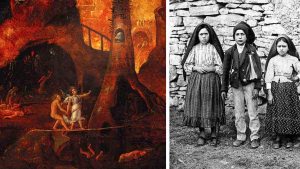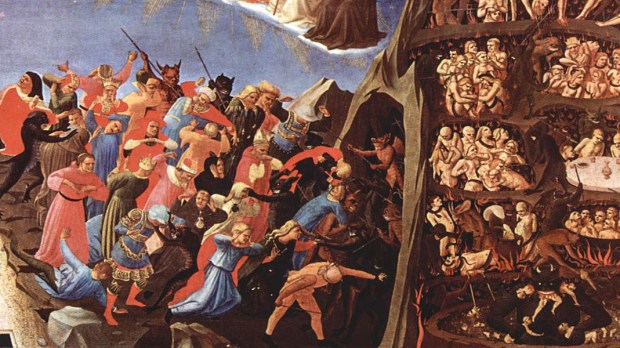Minutes from a meeting of the Senior Staff of Hell …
SATAN: “How is the planning for our new expansion campaign coming along? Do we have a new slogan yet?”
DIABOLICAL MINION #1: “How about this? ‘There is no God!’”
SATAN: “Boring! Been there; done that! What else do you have?”
DIABOLICAL MINION #2: “How about this? ‘There is no Satan!’”
SATAN: “Okay. Clever, reliable—but it’s not fresh! What else do you have?”
DIABOLICAL MINION #3: How about this? ‘There is no hurry!’”
SATAN: “Tell me more …”
The truly awe-full fact is that there is a hurry, a truly terrible hurry—we are quite literally running outof time and into eternity. We humans are paradoxically mortal—born to die—while we’re also immortal—destined for eternity. We’re rational and free, which means we’re moral agents who will be rightly held accountable by an all-holy God. That means we should be spending a lot more time and energy than nearly all of us do, thinking about time, eternity, Heaven and Hell.
During the month of November, when we pray for our beloved dead, I’ve been offering here a series of meditations on the Four Last Things: Death, Judgment, Heaven and Hell. (I wrote for Aleteia about Hell and Lent HERE.) As I write this meditation on Hell, I’m aware some folks may already be rolling their eyes. References to Hell elicit objections from the naively pious and the naively secular.

Read more:
3 Times Pope Francis warned about Hell
The naively pious objection: “Oh Father! Where have you been for the past five years? The past 50 years? Haven’t you heard about MERCY?”
The naively secular objection: “Oh Father! You clerics are all the same! Blathering on about the ‘joys of Heaven and the pains of Hell!’ We secularists see through it all! Your fire-and-brimstone/pie-in-the-sky-when-you-die preaching is about manipulation. You’re trying to bribe/scare people into behaving and donating!”
What these two objections have in common is a two-fold problem: Both fail to take seriously both God and man. God is all-holy, God is all-love, God is infinite goodness. He can only want the best for man, which is himself. God’s moral nature precludes ignoring or discounting good or evil. He wants to fill every human life (body and soul) with himself.
That divine self-gift would be absolutely unbearable for a person unprepared to receive it. A person attached to sin in any way cannot rightly love God who is Love-Absolute-and-Love-Incarnate. A person made for love and ready to receive Love Personified will not be satisfied with anything or anyone else. A person made-for-Heaven who has been readied for Heaven in this life will rightly enjoy, body and soul, eternal delight in union with the Divine Beloved. Heaven is a meeting of justice and mercy, human nature and divine grace—a destination of eternity for those who have stood the test of time.
The pious objections to the more lurid and fanciful depictions of Hell don’t take seriously that mortal/immortal humans can freely make choices against the all-holy God: “How can a MERCIFUL God allow the torments of Hell?”
The secular objections to the more lurid and fanciful depictions of Hell don’t take seriously that mortal/immortal humans can freely make choices against the all-holy God: “How can a JUST God allow the torments of Hell?”
The astounding freedom of the human person to choose the glories of God is also the horrifying freedom to reject the glories of God. It is divine justice to acknowledge that a human person has spurned God’s offer of divine love and eternal joy—in other words, that a human person has chosen Hell over Heaven. It would be an injustice to both human dignity and divine sanctity to do otherwise.

Read more:
What is freedom, anyway? And how are we living it?
Likewise, it is divine mercy to be subject to the torments of Hell as a distraction from the unfathomable realization that one will never see God face-to-face. Union-with-God is so good that separation-from-God must be that bad. An eternity contemplating the loss of God is so incomprehensibly bleak that the torments of Hell (for example, as illustrated by the painting of Fra Angelico) can be seen as a welcome distraction.
The inevitable, absolute greatness of God, and the intended but optional greatness of man, understood in terms of justice and mercy, require the reality of the gain or loss of Heaven, the reality of the choice for Heaven or Hell.
We finite creatures, we humans made in the image and likeness of God, pass through time, and, body and soul, we arrive at eternity.
Jacinta, one of the Fatima visionaries, said, “If men knew what eternity is, they would do everything to change their lives.” While there is still time, let us choose Heaven!
When I write next, I will begin a series of meditations on Advent. Until then, let’s keep each other in prayer.

Read more:
Fatima visionaries’ terrifying vision of Hell

Read more:
God never tires of forgiving

